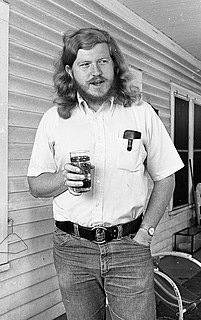A Quote by Stanley Hauerwas
A social order bent on producing wealth as an end in itself cannot avoid the creation of a people whose souls are superficial and whose daily life is captured by sentimentalities. They will ask questions like “why does a good God let bad things happen to good people ” such people cannot imagine that a people once existed who produced and sang the psalms. If we learn to say “God ” we will do so with the prayer “My God my God why have you forsaken me?
Quote Topics
Ask
Avoid
Bad
Bad Thing
Bad Things
Bad Things Happen
Bent
Cannot
Captured
Creation
Daily
Daily Life
Does
End
Existed
Forsaken
God
Good
Good God
Good People
Happen
Imagine
Imagine That
Itself
Learn
Life
Life Is
Like
Me
Once
Order
People
Prayer
Produced
Producing
Psalms
Questions
Sang
Say
Social
Social Order
Souls
Superficial
Things
Things Happen
Wealth
Whose
Why
Will
Related Quotes
On the Cross the Jesus of the Four Gospels, who was God, cried out My God, my God, why hast thou forsaken me? God cannot forsake himself, Jesus was God himself. Yet God forsook Jesus, and the latter cried out to know why he was forsaken. Any able divine will explain that of course he knew, and that he was not forsaken. The explanation renders it difficult to believe the dying cry, and the passage becomes one of the mysteries of the holy Christian religion, which, unless a man rightly believe, without doubt he shall perish everlastingly.
The lack of insight to reality, life and history as well as into God's ways, or sunan in His creation, some people will continue to seek or demand the impossible. They will imagine what does not or cannot happen, misunderstand occurrences and events, and interpret them on the basis of cherished illusions which in no way reflect God's sunan or the essence of Islamic law.
If our testimonies are strong onthis point and if we feel the absolute assurance that God loves us, we will change our questons. We won't ask, 'Why did this happen?' or 'Why doesn't God care about me?' Instead, our questions will become, 'What can I learn from this experience?' or 'How does the Lord want me to handle this?
And the reason is found in the first lie - the lie which you hold as the truth about God - that God cannot be trusted; that God's love cannot be depended upon; that God's acceptance of you is conditional; that the ultimate outcome is thus in doubt. For if you cannot depend on God's love to always be there, on whose love can you depend? If God retreats and withdraws when you do not perform properly, will not mere mortals also?
It will be hard for you not to ask why this must be. God knows why, and that may be as good to us as though we knew a thousand reasons. I pray God to hold you quiet and patient and uncomplaining, and help you bear the weight of this seemingly unintelligible sorrow. I hope you will remember that this is the only world in which a Christian can suffer, and suffer patiently and meekly. We cannot suffer by and by. God helps us to glorify Him now, when we can.
If you do not take the distinction between good and bad very seriously, then it is easy to say that anything you find in this world is a part of God. But, of course, if you think some things really bad, and God really good, then you cannot talk like that. You must believe that God is separate from the world and that some of the things we see in it are contrary to His will.
God is not a person at all. You cannot worship God. You can live in a godly way but you cannot worship God - there is nobody to worship. All your worship is sheer stupidity, all your images of God are your own creation. There is no God as such, but there is godliness, certainly - in the flowers, in the birds, in the stars, in the eyes of the people, when a song arises in the heart and poetry surrounds you... all this is God. Let us say `godliness` rather than using the word `God` - that word gives you the idea of a person, and God is not a person but a presence.
We cannot escape from our daily routine, because it will go with us wherever we go.... God must be sought and found in the things of our world. By regarding our daily duties as something performed for the honour and glory of God, we can convert what was hitherto soul-killing monotony, to a living worship of God in all our actions. Everyday life must become itself our prayer.
We are in danger of forgetting that we cannot do what God does, and that God will not do what we can do. We cannot save ourselves nor sanctify ourselves, God does that; but God will not give us good habits, He will not give us character, He will not make us walk aright. We have to do all that ourselves.
If prayer stands as the place where God and human beings meet, then I must learn about prayer. Most of my struggles in the Christian life circle around the same two themes: why God doesn't act the way we want God to, and why I don't act the way God wants me to. Prayer is the precise point where those themes converge.




































